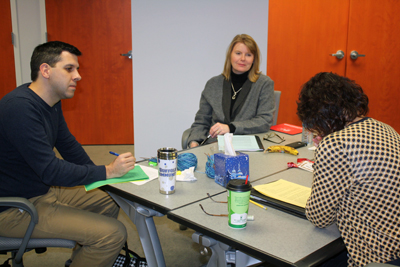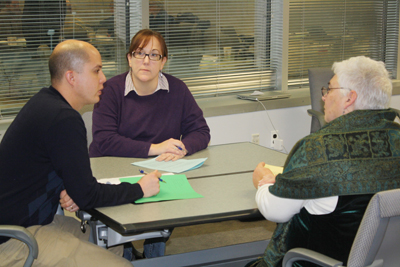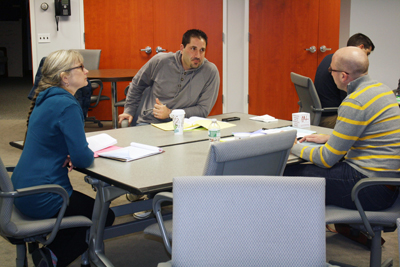February 2015
On a snowy January morning over this past winter break, I began training to become a conflict resolution mediator with twelve other members of the FA, and I spent the first few days toying with issues of power and rhetoric and thinking about how well I would do if I were asked to compromise, which frankly feels a little like losing to me. I mean, I could try to be politically correct and talk about how great compromise is, but I’d be lying. Maybe I should run for Congress. Colleagues who come to us for mediation will be in conflict. They’ll be stuck, perhaps, in pre-established positions that they can’t see beyond. We’ve all been there. We’ve seen it on television, in government, in our own personal lives. You stake your claim and you stick with it. It’s Congress all over again. Fourteen years ago, when I first started my doctorate—don’t judge; it takes some of us longer than others—I wrote this to introduce my Postmodern Rhetoric final paper: The heads of Hillary Clinton, Rudy Giuliani, Al Gore and George Bush are poised, mouths open, frozen and suspended above the word, “Rhetoric,” in an advertisement plastered on a partition in a Long Island Rail Road car. Underneath the headshot appear the hosts of “This Week,” a Sunday morning political commentary program. Their mouths are closed, in a typical portrait shot, personifying the word underneath their photos, “Translation.” I saw the advertisement every Monday night on the #1 train going up to 116th Street. The first night of my Introduction to Journalism class this January, I asked students what they thought about the role of the journalist in a democracy. I told them about the text of the poster. We talked about rhetoric and writing, and they told me that all rhetoric is empty rhetoric, talking heads, crooked politicians and opinionated journalists, and that all you can do is arm yourself against it, recognize when you are being taken and react accordingly. Rhetoric and change, to my students, were at best in opposition or unrelated. While one side of my brain was screaming, “Where are your ideals? Where is your optimism? Why don’t you think journalists have the power to overthrow the government, break The Man, stop the exploitation of human beings by large corporations? Why isn’t this the 60s?” the other side of my brain was saying, “They’re not wrong.” Back in 2000, in that Postmodern Rhetoric class, we read James Kastely’s “From Formalism to Inquiry: A Model of Argument in Antigone,” which uses Sophocles’ Antigone as a model of argument gone wrong and as a model of argument typical of our media and our society. One of Kastely’s main ideas is this: the point of argumentation as it exists today is not to learn anything or to be changed as a human being. The point is to win, to exert your own will over someone else. Kastely tells us, “the words of an other are beside the point.” Not much has changed in 14 years. “We should anticipate that arguments will provoke resistance precisely because they attack a narcissism that we all possess,” Kastely says. We’re stuck in those pre-established positions, held in place by ego, by the desire to be right, to win. Kastely (Kastely rocks, yes?) also tells us, “Behind the failure of the argument is the problem of seeing difference as a threat that makes recognizing the other impossible to individuals who seek to protect the superficial coherence of their existing understanding.” Without an understanding of difference and of diversity, or of how one's actions ripple out and affect the lives of others, arguers can never agree on what is at issue, what values, beliefs, needs are at stake, and there can be no hope for change.
Seeing difference as a threat further makes agreeing to disagree an unacceptable rhetorical stance. There can be nothing but what my students see in that advertisement on the LIRR and on their televisions and electronic devices every day—talking heads, shouting one-sided, empty rhetoric while all around them the status quo is maintained. But. This January, during our winter mediation workshop, we focused on conflict resolution, negotiation and mediation. We talked about conflict and power and learning to listen to what the other is saying. Stephen LaLonde, our workshop leader, told us this: “In constructive conflict, people interact to learn, not to protect.” Crazy, right? That we might be able to break down habits of response? The mediation program is being designed to help participants figure out creative solutions to their conflicts—not compromise, where everyone gives something up—but new and previously unconsidered solutions that benefit both sides. As mediators, it will be up to us to guide, to suggest, to facilitate, but never to impose or even devise our own solutions to conflicts. We will, in an ideal situation, help participants to figure out what they really want and need and then to figure ways in which both parties get those things—ways that maybe neither side could see before. LaLonde gave this example. During contract negotiations at one company, management and staff members were arguing—who can imagine?—over raises. After a lot of discussion and questioning, of interacting, listening and learning, it became apparent that childcare costs were becoming financially burdensome for staff members with young children, hence the need for more financial compensation. Managers and staff members were then able to agree on a system of flex time that helped staff members need less child care, ending up with more money in their pockets. Staff members were then able to accept smaller raises, which of course made management happy. (If any of our administrators are reading this, this is by no means part of contract negotiations, or any kind of agreement!) No one relinquished power; no one lost anything. Each side gained what they need to go on and be successful in their work. Marilyn Cooper, another of my favorite rhetoricians (and because we’re still talking about argument, power and agency, from Aristotle to today) says that we “become responsible rhetors by recognizing the audience not only as agents, but as concrete others who have opinions and beliefs grounded in the experiences and perceptions and meanings constructed in their brains…. This is also the skill of responsible rhetors, to be open to and responsive to the meanings of others, to not negate others by insisting that only they themselves own the truth.” This is a pretty funky and innovative thing we’re doing—asking people to trust us, thirteen members of the FA, with their conflicts—asking people to let go of traditional or habitual concepts of power, and to be more conscious of the experiences, perceptions and truths of others. But I think it’s a good thing, and I like to think about how small changes in how we deal with conflict in creative and innovative ways here on campus might give us ideas about how we deal with conflict in other areas of our lives—and might even spread. You know, if one person, just one person, embraces mediation, they may think he's
really sick and they won't give him tenure. And if two people do it, in harmony, they may think they're both commies and they won't give either of them tenure. And if three people do it! Can you imagine three people walkin' in, mediatin’, and walkin' out? They may think it's an organization! And can you imagine fifty people a day? I said FIFTY people a day... Walkin' in, mediatin’ and walkin' out? Friends, they may think it's a MOVEMENT! And that's what it is. And all you gotta do to join is to ask for a mediator the next time you find yourself in a conflict. |



